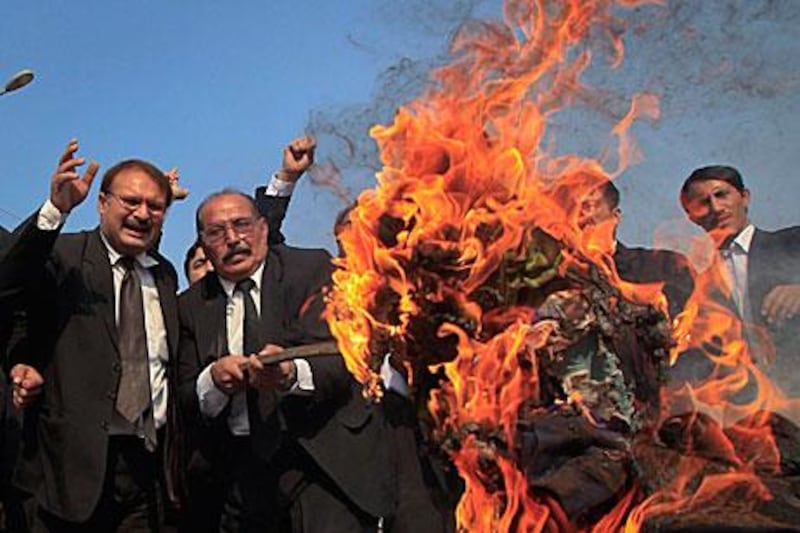ISLAMABAD // The Nato air raids that killed 24 Pakistani soldiers lasted almost two hours - continuing after commanders pleaded with the US-led coalition forces to stop, the army claimed yesterday.
The charges could further stoke anti-American sentiment in the country.
Nato has apologised to Pakistan and the families of the dead. But it has yet to explain what happened, pending an investigation.
Afghan officials said an Afghan-Nato force on their side of the border received incoming fire from the direction of the Pakistani posts and called in air strikes.
Ties between Pakistan and the US were already deteriorating, weighed down by the manner of the killing of Osama bin Laden in May and the increasing number of deaths from US drone strikes.
The Pakistan army's spokesman, Major General Athar Abbas, said the dead soldiers were the victims of an unprovoked aggression.
He claimed the attack lasted almost two hours and that commanders had contacted Nato counterparts asking that "they get this fire to cease, but somehow it continued".
The poorly defined, mountainous border that divides ethnic Pashtuns has been a constant source of tension between Pakistan and the US.
Nato officials complain that insurgents fire from across the frontier, often from positions close to Pakistani soldiers, who have been accused of tolerating or supporting the militants.
Saturday's strikes added to the popular anger in Pakistan against the US-led coalition in Afghanistan and US pressure on Pakistan to do more to tackle militancy.
Many in the army, parliament, general population and media already believed the US and Nato were hostile to Pakistan.
Although the US is widely disliked in Pakistan, the army has accepted billions in American aid over the past decade in return for its cooperation in fighting Al Qaeda and the Taliban.
In Pakistan, the army controls relations with the US - the country's most important yet most troublesome ally, militarily and financially.
The generals will likely drive the response, backed by a public outcry, to the deadly attack on Pakistani troops. The military's supremacy over the weak, increasingly unpopular civilian government when it comes to international relations was underscored by the downfall of the former ambassador to Washington, Hussain Haqqani.
Mr Haqqani, who had already drawn the military's ire with outspoken comments about its influence, was forced out in a scandal over his role in reported efforts by Islamabad to seek Washington's help to rein in the military.
The army has played a dominant role in civil and international affairs since Pakistan was created in 1947.
This, along with its control of Pakistan's nuclear arsenal, means Washington relies more on the army leadership than Islamabad's.
"The [Haqqani] resignation shows the military has further dug in as far as ties with the US and security issues are concerned. The army has overriding control on these issues," said the retired analyst and former army general, Talat Masood.
Relations with Pakistan are crucial for the US as it struggles to stabilise Afghanistan before it withdraws its forces by 2014.
But relations have nosedived, particularly after US Navy Seals killed bin Laden in a secret raid in May, embarrassing the Pakistani army.
Pakistan's military halved the number of US military trainers in the country after the raid and privately tried to restrict the movements of US diplomats. In return, the US suspended military aid.
Many in the US doubt Pakistan is a reliable partner in the war against militancy. Suspicions over army and intelligence links with militants deepened after bin Laden was found living near the main military academy. According to some reports, he had been there five years.
Some US legislators and Republican presidential candidates have demanded all aid to Pakistan stop.
Complicating issues is the geopolitical tug-of-war over influence in Afghanistan, a strategically vital area that has been fought over by major powers for centuries.
Pakistan fears the US departure could see regional powers such as India, China, Iran and Saudi Arabia all jostle for influence there.
But while Washington sees Pakistan as important for its efforts to stabilise Afghanistan, Pakistan needs Washington's financial help.
"Pakistan-US relations are like a bad marriage. The spouses can't divorce and have to make a compromise," said Mr Masood. "They will continue to go about like that. They have no other choices."
[ foreign.desk@thenational.ae ]
* Additional reporting by Associated Press





